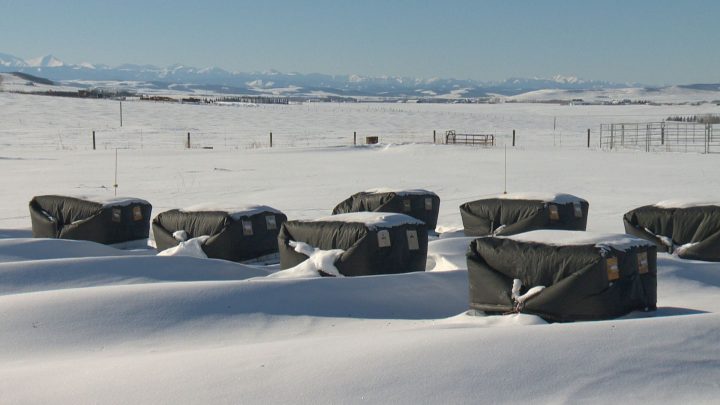As Alberta’s cold snap continues, it’s not only humans who are scrambling to stay warm — how do bees bundle up in winter and live to pollinate in the spring?

Chinook Honey Company, a bee farm in Okotoks established in 1995, is doing its darndest to address the needs of millions of honey bees so that the biting weather doesn’t dent the population.
“Are they going to be warm enough? Are they going to be dry? And are they going to have enough honey stored to feed them through the colder months when there’s nothing for them to eat in the natural world?” said Jessie Smulders, a beekeeper for the past seven years.
The farm wraps their colonies — 150 hives with 80,000 bees each — with winter wraps.

Get breaking National news
“It’s like a sleeping bag for beehives… That’s allowing some of that heat to stay trapped,” Smulders explained.
In case snow blocks the lower colony entrances, Chinook Honey also puts entrances up higher so bees can still fly and air can circulate.
Last year’s weather brought challenges with the sheer amount of snow and its delay in the season. As cold temperatures stretch into March, beekeepers are getting anxious.
“Colder weather earlier in the year, I find, there’s not as much worry,” Smulders said. “As it gets later and later, we talk about starting to get in there and feed the bees.”
The bees eat honey that they have stored over summer. When food supply is thin, beekeepers step in with sugar syrup or patties.
“When it’s really cold for a long period of time for the bees, our main concern is starvation,” Smulders said. “The longer the cold weather persists, the more that we worry the bees are going to run out of food.”
“Cold weather is really causing bees to cluster very closely together, and when this weather persists for long periods of time, what the bees are doing is eating all that food that’s really close by them and they’re not able to break that tight cluster,” Smulders continued. “There may be food a quarter of an inch away that they’re not able to access.
“So whenever we get a really nice chinook, that’s the bees’ opportunity to move that cluster to a new location in the hive where they’re going to have more access to food.”
WATCH: In a TED Talk, Marla Spivak discusses why bee colonies collapsed in 2006 and how that impacts humans, especially since bees pollinate a third of the world’s crops.




Comments
Want to discuss? Please read our Commenting Policy first.